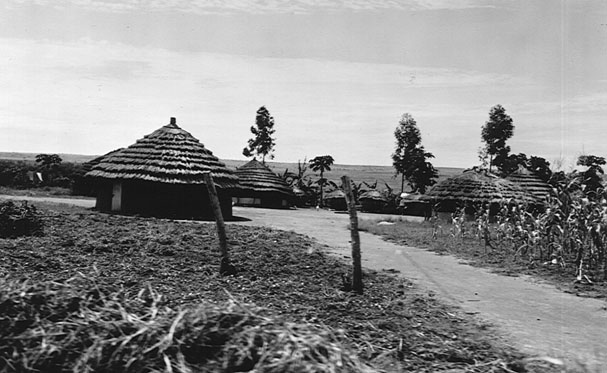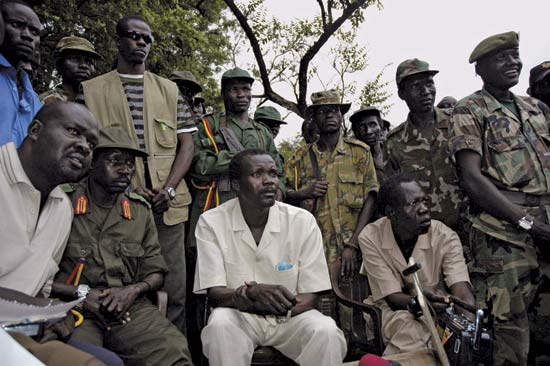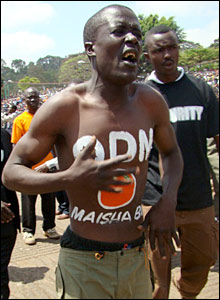Sugar canes as tall as elephant grass, sweet potatoes as big as a cows head and the sound of singing, drums and harps ( adungu) spread like sweet smelling dry millet next to smoky homesteads is what the rural North of Uganda was once.
Around this time last year- driving across Atiak to Moyo in West Nile, the sudden appearance of hundreds of bright colored water jerricans in the middle of IDP settlements crowded like mourners reminded one of the decay of this society.
The receding of the war drums to such far sounding areas like Garamba National Park in Congo as a result of the one and a half year Juba peace talks is once again breathing life into long forgotten fireplaces around which old men told stories to attentive young minds as is the tradition of the Luo and neighboring tribes – while women mingled kwon (millet bread) mixed with dry meats and vegetables.
It’s possible the old days will not return at least not in the form that a new generation of Northern Ugandans remembers. Having grown under the clutches of a nightmare not of their own making- the future of these Ugandans is on how local and international peacemakers sustain the peace that has so far been largely a promise that Joseph Kony and his remaining rebels will make a deal with the Ugandan government.
With the New Year comes the hope that Kony will negotiate in person his abandonment of armed struggle at Juba. It is a faint hope but the rebel leader has few choices. The last 12 months has seen his forces split and the people he claimed to serve alarmed by his treatment of his second in command- Vincent Otti. Alienated from the Acholi, Kony has little hope of survival except as a mercenary, wanted by an international court for crimes against humanity.
As the clock ticks to the trickle of people back to their homes, 2008 will be the year of the greatest challenge to making peace in Uganda. Firstly, Ugandan and regional actors must allow for Kony to be relocated further away from the torched geography of this 21-year conflict. One way under the Juba process is for him to surrender to his former benefactors- the government of Omar El Bashir in Khartoum and be in a supervised in-country exile within Sudan.
Whatever deal is done- the bigger task rests with the Ugandan government. If Kony was committed to resisting President Yoweri Museveni’s National Resistance Movement throughout this period, the military backed politics of Kampala bears the bigger responsibility of letting him succeed in laying to waste the Northern countryside.
The government of Uganda mustered just enough political will to contain the scourge of LRA within the North and looked on as military leaders looted their own resources for the war- as seen from the testimony of Gen James Kazini in the Ghost Soldier inquiry.
As the North imploded into mass human suffering, its own politicians were a minority in the government unable to rally the rest of the country or the rest of the world to bring an end to the conflict. If Juba succeeds, the political career of Northern leaders as well as that of Mr. Museveni who has faced a consistent resistance from both armed insurgents like Kony and unarmed political opposition from local and Diaspora Northerners- will be shaped by how well they respond to the task of reconstructing the country beyond the bridge at Karuma.
One opportunity that the Juba process as offered national leaders-is to use the reconstruction process to rehabilitate the historically brittle relationship between Northerners and Southerners.
As the New Year dawns, attention must turn both to the conclusion of the formal peace process in Juba and the steeper challenges of putting children back in schools and mothers in their own kitchens. The US$ 600 million Peace Recovery and Development Plan (PRDP) that the government announced, six days after Independence Day this year should not be turned into a granary for government fat cats but a test case for the commitment of leaders from the North and South to right the wrongs of the past two decades.
If anything peace in Northern Uganda may impose even bigger challenges than replanting sugar canes along former rebel paths. It will test the ability of Northern leaders to remain steadfast and committed to delivering to their people and the NRM government of building a legitimacy based on the delivery of public goods.
So far- judging by the vicious fallout between MP Okumu Reagan and Hon Morris Ogenga Latigo, the political unity of the North may become the first casualty of the peace process. This is bad news for those who have had to pay the true cost of war- the returning IDP’s.
NRM too, a party that has faced its own internal wars, has reason to move beyond its comfort zones and speeches-to take the task of rebuilding seriously. One huge task will be the creation of incentives, including tax breaks, and other sweeteners for exiled Northerners to return and participate in the rebuilding process. Another will be a robust veteran’s assistance problem for ex-combatants that take livelihood planning for former fighters beyond occasional handouts.
An optimistic view is to see the reconstruction of Northern Uganda itself as a turning point in the new political relations within Uganda’s multiparty politics.
The pessimistic view is much worse- and fears taller than elephant grass loom ahead if peace fails.










